#Chokwe Antar Lumumba
Text
A white supermajority of the Mississippi House voted after an intense, four-plus hour debate to create a separate court system and an expanded police force within the city of Jackson — the Blackest city in America — that would be appointed completely by white state officials.
If House Bill 1020 becomes law later this session, the white Chief Justice of the Mississippi Supreme Court would appoint two judges to oversee a new district within the city — one that includes all of the city’s majority-white neighborhoods, among other areas. The white state Attorney General would appoint four prosecutors, a court clerk, and four public defenders for the new district. The white state Public Safety Commissioner would oversee an expanded Capitol Police force, run currently by a white chief.
The appointments by state officials would occur in lieu of judges and prosecutors being elected by the local residents of Jackson and Hinds County — as is the case in every other municipality and county in the state.
Mississippi’s capital city is 80% Black and home to a higher percentage of Black residents than any major American city. Mississippi’s Legislature is thoroughly controlled by white Republicans, who have redrawn districts over the past 30 years to ensure they can pass any bill without a single Democratic vote. Every legislative Republican is white, and most Democrats are Black.
After thorough and passionate dissent from Black members of the House, the bill passed 76-38 Tuesday primarily along party lines. Two Black member of the House — Rep. Cedric Burnett, a Democrat from Tunica, and Angela Cockerham, an independent from Magnolia — voted for the measure. All but one lawmaker representing the city of Jackson — Rep. Shanda Yates, a white independent — opposed the bill.
“Only in Mississippi would we have a bill like this … where we say solving the problem requires removing the vote from Black people,” Rep. Ed Blackmon, a Democrat from Canton, said while pleading with his colleagues to oppose the measure.
For most of the debate, Jackson Mayor Chokwe Antar Lumumba — who has been publicly chided by the white Republicans who lead the Legislature — looked down on the House chamber from the gallery. Lumumba accused the Legislature earlier this year of practicing “plantation politics” in terms of its treatment of Jackson, and of the bill that passed Tuesday, he said: “It reminds me of apartheid.”
Hinds County Circuit Judge Adrienne Wooten, who served in the House before being elected judge and would be one of the existing judges to lose jurisdiction under this House proposal, also watched the debate.
Public Safety Commissioner Sean Tindell, who oversees the Capitol Police, watched a portion of the debate from the House gallery, chuckling at times when Democrats made impassioned points about the bill. Lt. Gov. Delbert Hosemann, the only statewide elected official who owns a house in Jackson, walked onto the House floor shortly before the final vote.
Rep. Blackmon, a civil rights leader who has a decades-long history of championing voting issues, equated the current legislation to the Jim Crow-era 1890 Constitution that was written to strip voting rights from Black Mississippians.
“This is just like the 1890 Constitution all over again,” Blackmon said from the floor. “We are doing exactly what they said they were doing back then: ‘Helping those people because they can’t govern themselves.'”
The bill was authored by Rep. Trey Lamar, a Republican whose hometown of Senatobia is 172 miles north of Jackson. It was sent to Lamar’s committee by Speaker Philip Gunn instead of a House Judiciary Committee, where similar legislation normally would be heard.
“This bill is designed to make our capital city of Jackson, Mississippi, a safer place,” Lamar said, citing numerous news sources who have covered Jackson’s high crime rates. Dwelling on a long backlog of Hinds County court cases, Lamar said the bill was designed to “help not hinder the (Hinds County) court system.”
“My constituents want to feel safe when they come here,” Lamar said, adding the capital city belonged to all the citizens of the state. “Where I am coming from with this bill is to help the citizens of Jackson and Hinds County.”
Opponents of the legislation, dozens of whom have protested at the Capitol several days this year, accused the authors of carving out mostly white, affluent areas of the city to be put in the new district.
In earlier sessions, the Legislature created the Capitol Complex Improvement District, which covers much of the downtown, including the state government office complex and other areas of Jackson. The bill would extend the existing district south to Highway 80, north to County Line Road, west to State Street and east to the Pearl River. Between 40,000 and 50,000 people live within the area.
The bill would double the funding for the district to $20 million in order to increase the size of the existing Capitol Police force, which has received broad criticism from Jacksonians for shooting several people in recent months with little accountability. The new court system laid out in House Bill 1020 is estimated to cost $1.6 million annually.
Many House members who represent Jackson on Tuesday said they were never consulted by House leadership about the bill. Several times during the debate, they pointed out that Republican leaders have never proposed increasing the number of elected judges to address a backlog of cases or increasing state funding to assist an overloaded Jackson Police Department.
Democratic members of the House said if they wanted to help with the crime problem, the Legislature could increase the number of elected judges in Hinds County. Blackmon said Hinds County was provided four judges in 1992 when a major redistricting occurred, and that number has not increased since then even as the caseload for the four judges has exploded.
In addition, Blackmon said the number of assistant prosecuting attorneys could be increased within Hinds County. In Lamar’s bill, the prosecuting of cases within the district would be conducted by attorneys in the office of Attorney General Lynn Fitch, who is white. Blackmon said the bill was “about a land grab,” not about fighting crime. He said other municipalities in the state had higher crime rates than Jackson. Blackmon asked why the bill would give the appointed judges the authority to hear civil cases that had nothing to do with crime.
“When Jackson becomes the No. 1 place for murder, we have a problem,” Lamar responded, highlighting the city’s long backlog of court cases. Several Democrats, during the debate, pointed out that the state of Mississippi’s crime lab has a lengthy backlog, as well, adding to the difficult in closing cases in Hinds County.
Lamar said the Mississippi Constitution gives the Legislature the authority to create “inferior courts,” as the Capitol Complex system would be. The decisions of the appointed judges can be appealed to Hinds County Circuit Court.
“We are not incompetent,” said Rep. Chris Bell, D-Jackson. “Our judges are not incompetent.”
Democrats offered seven amendments, including one to make the judges elected. All were defeated primarily along partisan and racial lines. An amendment offered by Rep. Cheikh Taylor, D-Starkville, to require the Capitol Police to wear body cameras was approved. Lamar voiced support for the amendment.
Much of the debate centered around the issue of creating a court where the Black majority in Hinds County would not be allowed to vote on judges.
One amendment that was defeated would require the appointed judges to come from Hinds County. Lamar said by allowing the judges to come from areas other than Hinds County would ensure “the best and brightest” could serve. Black legislators said the comment implied that the judges and other court staff could not be found within the Black majority population of Hinds County. When asked why he could not add more elected judges to Hinds County rather than appointing judges to the new district, Lamar said, “This is the bill that is before the body.”
#us politics#news#2023#Mississippi today#Mississippi#conservatives#republicans#gop#institutional racism#end institutional racism#Mississippi Supreme Court#House Bill 1020#jackson#Mississippi Legislature#Rep. Ed Blackmon#Chokwe Antar Lumumba#1890 Constitution#jim crow#Rep. Trey Lamar#Jackson Police Department#Mississippi Capitol Police#Hinds County#Lynn Fitch#Mississippi Constitution#racism#racists
98 notes
·
View notes
Text
youtube
‘I’ve been saying that it’s not a matter of if our system would fail, but when’ — Jackson Mayor Chokwe Antar Lumumba says the city's ongoing clean water crisis is a result of 'years and years of accumulated problems.'
The Mississippi capital has been inundated with heavy rains and flooding this week, crippling the city's water treatment infrastructure and leading to a state of emergency for 150,000+ people.
For more U.S. news, subscribe to NowThis News.
#mississippi #water #news #Politics #News #NowThis
#now this news#now this#solarpunk#USA#Jackson#missippi#chokwe antar lumumba#water#water crisis#clean water#flooding#Youtube
3 notes
·
View notes
Text
The Only State Capital Where You Can’t Drink the Water — Practical Engineering
s a blast of bitter Arctic air poured into North America around Christmas Time in December 2022, weather conditions impacted nearly every aspect of life, from travel to electricity to just trying to get out the front door. But the frigid temperatures kicked one American city while it was already down. For many people, the idea of not being able to drink the water in their own house is unimaginable. But for the residents of Jackson, Mississippi, it was just another day…or twelve. Last August, a flood took out the aging water system, leaving nearly everyone in the City without water for more than a week. Only a few months later, that arctic weather spell broke so many pipes in the city that residents again lost access to water, some for nearly two weeks, continuing one of the worst water crises in American history. It’s a stark reminder of the massive undertaking involved in providing clean water, day after day, to an entire city of people at once and the enormous stakes of getting it wrong. What does it really take to run a public water supply, what happened in Jackson, and what does its future hold? I’m Grady, and this is Practical Engineering. In today’s episodes, we’re talking about the Jackson water crisis.
Jackson is not only the capital of Mississippi but also its largest city. Its water utility has around 70,000 connections to homes and businesses and services about 170,000 people through two surface water treatment plants. The OB Curtis plant is the larger of the two, with a rated capacity of 50 million gallons per day or 190,000 cubic meters per day. An intake structure collects raw water from a nearby reservoir. That’s the term for untreated surface water. From there, two large-diameter pipelines carry the water to the headworks of the plant. At the headworks, pumps send the raw water through various treatment processes to clean it up and, ideally, make it safe for drinking. Closer to downtown, the JH Fewell Plant has a rated capacity of about half the OB Curtis plant. It draws raw water directly from the Pearl River downstream of the reservoir. The City also has a few groundwater wells to supplement the surface water system.
In normal conditions, clean and drinkable water flows from both plants into a network of pipes and elevated tanks that deliver that water to each building in the City of Jackson. This is a public water supply, something that might sound kind of obvious, but that term has a specific meaning. Because not just anyone can hook a bunch of pipes up to customers and sell them water. Water is both an immediate necessity for life on this blue earth and a powerful agent of disease transmission, so we have rules that regulate those who would collect it and deliver it to others. Specifically, we have the Safe Drinking Water Act, and each state also has its own rules that govern contaminants, monitoring, and public notifications. The goal of drinking water regulation is to make sure that no matter where you are in the United States, you can open the tap and use that water to cook, bathe, or drink, and not have to worry about getting sick. This might sound like a relatively ordinary endeavor, but designing, building, operating, and maintaining a public water system - even for a relatively small city like Jackson - is a monumental enterprise that requires a lot of money, a lot of people, a lot of oversight, and a lot of infrastructure.
Unfortunately, Jackson has gone without many of those necessities for decades, creating issues in the City that eventually led the federal government, specifically the Environmental Protection Agency or EPA, to conduct an inspection of the system in 2020. What they saw shocked them. The City’s water system was in such a state of disrepair and mismanagement that the EPA immediately issued an emergency order. Regulation of a public water system usually falls to the state, in this case the Mississippi State Department of Health, but the federal government can step in if there is an imminent and substantial threat to public health, and in this case, the EPA decided there was. The emergency order required the City to create a plan to fix all the broken equipment and bring the system back into working order, but the urgency was too little, and too late. From that time in early 2020 until nearly the present day, Jackson’s water system faced a seemingly unending cascade of challenges bringing to light just how bad things had gotten.
In February of 2021, the same winter storm that nearly took out the Texas power grid, hit the City of Jackson too. The unseasonably cold weather affected water mains below the city streets, causing them to break and leak. So many water mains broke that the pumps at the water treatment plants couldn’t keep up. The result was the pressure in the system dropping, in some places so low that they had no water pressure at all. In other words, they had no water. Like it had done so many times before, the City issued a system-wide boil water notice. You may have heard this term before but not quite understood the implications. Water systems are pressurized well beyond what’s needed to move the water through the pipes. That’s done for a reason. High pressure keeps unwanted contaminants out. If the system loses pressure, pollutants can be drawn into the pipes through cracks, breaks, or joints, contaminating the water inside. So if a main breaks or a pump stops working or a treatment plant has to shut down, the operator sends out a boil water notice to affected customers, letting them know that their water might be contaminated, and that it should be boiled to kill any potential pathogens before using it for drinking or cooking. This notice in February 2021 lasted for an entire month. Imagine not being able to trust the water from your tap for that long. But even though that particular notice was eventually lifted, residents of Jackson have lived under a practically constant recommendation to boil the water that comes out of the tap, and that’s if they even have any water to boil in the first place.
Only a few months later, in April of 2021, an electrical fire in the OB Curtis plant took out all five of the high-service pumps, the ones that deliver fresh water into the distribution system. Again the pipes lost pressure, and again a boil water notice was issued, this one lasting for four days. It would be another year before the electrical panel for the pumps would be replaced, crippling the treatment plant’s ability to pressurize the water system. That November, chemical feed issues forced operators to shut down the OB Curtis plant, once again causing the system pressure to drop. That boil water notice lasted another four days. In April 2022, water hammer broke a pipe in the OB Curtis plant, again requiring a shutdown. In June, filters at the plant failed, requiring yet another shutdown and yet another system-wide boil water notice (this one for two weeks while the City worked to fix the problem).
In July, the EPA issued a report summarizing the litany of problems faced by the Jackson water distribution system, and the list would be impressive if it didn’t represent such an injustice to the people the system is meant to serve. Water mains were constantly breaking. The City had an annual rate of 55 breaks per 100 miles of pipe when the industry benchmark is 15. There was no monitoring of pressure, meaning the City had no way to identify or address problem areas in the system. There was no map of the system pipes or valves, making it difficult or impossible to implement repairs. Water towers weren’t getting enough flow, causing the water inside to stagnate. Monitoring equipment in the treatment plants wasn’t working, and if it was working, it wasn’t calibrated. And if it was calibrated, there wasn’t enough staff to keep an eye on it.
For an extended period, the utility had no manager, and it almost never had enough operators to staff the plants. A treatment plant operator has to be licensed and know a lot about chemistry and hydraulics and the various equipment used to clean water. It’s usually a great career because it doesn’t require a college degree, the work is rewarding, and the hours are consistent, but that wasn’t the case in Jackson. The City couldn’t pay enough to keep the three shifts at each treatment plant staffed 7 days per week, so the operators that were there were working lots of overtime, and occasionally not being paid for it.
Over the course of 4 years, the City had issued over 750 boil water notices because of the numerous losses of pressure. Water meters throughout the City were broken or misconfigured, meaning people weren’t being billed correctly or billed at all. In fact, the City estimated its non-revenue water, that’s the water that isn’t being paid for because of leaks or bad metering, to be 50 percent! Half of all the water treated and delivered into the distribution system was just being lost; it wasn’t generating revenue that could be used to maintain infrastructure and pay the staff. On top of that many of the large institutions that should be the utilities biggest customers, including local schools and hospitals, had opted to drill their own wells rather than rely on the failing city system, cutting off even more revenue. It’s not hard to imagine why the system was having trouble keeping up.
Throughout the entire year after the federal inspection, the City had been in constant negotiations with the state and the EPA trying to plot a path forward to bringing their ailing water system back into compliance. Biweekly meetings that included representatives from nearly every side of the issue were held to keep track of progress, but the progress was slow. In August of 2022, the OB Curtis plant switched the chemicals used for corrosion control, resulting in a boil water notice that lasted nearly a month. As the city worked to get the treatment process under control, the mayor said in a press conference, “Even when we come out of this boil water notice, I want to be clear that we are still in a state of emergency.” Then came the flood.
In late August, a deluge of heavy rainfall swept across Mississippi, dropping enormous volumes of precipitation across the state. The Ross Barnett Reservoir was already full of water, meaning all the inflows had to be released through the spillway. That swelled the Pearl River downstream, flooding streets and homes throughout the city. You might think a flood would be a good thing for a water system; after all, a flood is just a lot of water. But the problem with flooding is sediment. Heavy runoff carries soil, making the water muddy and much more difficult to treat. Several raw water pumps at OB Curtis quickly failed as they tried to deliver the sediment-laden water to the plant. And the fraction of water that did make it all the way to the plant was still a muddy mess. Any operator will tell you that slow changes to treatment processes and chemical feeds are best. When there’s a sudden shift in water quality that requires rapid adjustments to the processes, problems are bound to occur, and they did. Muddy water clogged filters and upset the various other processes to the point where the plant was utterly unable to treat it, resulting in a complete collapse of the system. The downstream surface water treatment plant suffered a similar fate. Nearly everyone in Jackson lost the ability to use water for basic safety and hygiene. Schools, restaurants, and businesses were closed. From washing hands to fighting fires to just having water to drink, the City was incapacitated.
The flooding threw the water crisis into the national spotlight. The Mayor, the governor, and eventually President Biden all issued disaster declarations, freeing up emergency resources. Federal officials and emergency workers flooded into Jackson to deliver bottled water to the residents and help restore the water supply. A team of engineers and drinking water experts worked to tackle miscellaneous projects at both treatment plants and most importantly, staff the facilities. By September 6, water pressure had been restored to customers, and a week later, the boil water notice was lifted. But it wasn’t the end of the emergency. The water system was barely functioning, and the relief team couldn’t stay in Jackson indefinitely. An emergency contract was issued for an outside company to take over operations of the water system for a year, but it was clear to everyone involved that an enormous capital improvement program and a huge influx of cash was the only way Jackson could pull itself out of the crisis. The City continued negotiating with the state, the EPA, and the Department of Justice, and in November of 2022, they appointed a third-party manager to take over control of the water system.
Ted Henifin, a licensed engineer and former public works director from Virginia, had already been involved in the emergency work, and was now tasked with 13 priority projects to bring Jackson’s system back, if not into perfect working order, at least into compliance with the drinking water laws. He was given broad power and freedom from normal contracting rules to hire, purchase, and contract as needed to get the work done, and he said in November that he planned to wrap up his priority projects within a year. And then the cold came.
The Christmas polar vortex event created a repeat of February 2021, cracking water mains with freezing weather, and creating so many leaks that the water treatment plants just couldn’t keep up. Jackson’s reliance on surface water creates a challenge because, unlike groundwater, the surface water supply is affected by ambient temperature. Freezing weather means chilly water in the reservoir, and when you’re sending very cold water through the underground mains, it causes them to shrink, and in some cases, to break. The cold weather also affected the chemistry of the raw water entering the plant, causing issues with the treatment processes and forcing the OB Curtis Plant to shut down. 22 schools had little to no water pressure and had to move to virtual learning as they returned from the winter break. For many, it was the last straw, and at least one restaurant decided to close their doors for good after having no water pressure for more than 40 days over the past two years, and many more days than that under boil water notices. The Christmas outage had customers without water for two weeks in the latest, but probably not the last event in the saga of underinvestment, misfortune, and utter failure to deliver a basic necessity to the residents of Jackson.
I talk about the engineering behind catastrophes like this, but in so many cases, it’s impossible to ignore the larger issues driving the story. Like all infrastructure, fresh water systems require investment. In an ideal world, those resources come from the water rates, the money that people pay for the water they receive, so the system supports itself. But, when those rates aren’t enough, something has to be done quickly and decisively, because chronic underinvestment creates a vicious cycle. The infrastructure fails, the billing system doesn’t work, customers leave, staff positions can’t be filled, and things just spiral downhill. So infrastructure funding is often supplemented by debt, by grants, by state and federal investment programs, all resources that require more than good management; they often require politicians. The people in charge of the water system in Jackson have been trying to sound the alarms for years. The Mayor even said the city was in an emergency the week before a flood hit the City that completely collapsed the water system. But it took that flood to convince politicians to free up resources. It’s also impossible to ignore the history of Jackson as a part of this story, including a legacy of racism that isolated and separated minorities, gutted the community tax base, and ultimately led to the failing infrastructure we see now. If you want to learn more about that history, there are far more qualified voices than mine to tell it, so I’ll leave some links to the best sources I found below.
In January, the mayor of Jackson announced that they had secured $800 million dollars in federal funding to tackle the city’s issues with water and sewer infrastructure. Those funds will take years to allocate and spend, but it’s another step forward for a city whose water system has fallen so far behind. Clean water is a human right, and the fact that the citizens of a major city in the US don’t have access to it is more than a shame. I’m sharing the story because I think it’s important for all of us to see the consequences of mismanagement, disregard, and discrimination and hopefully learn from those mistakes so that we can be better managers, leaders, or just advocates for the infrastructure that we rely on everyday.
#mississippi#Jackson#Chokwe antar lumumba#water inequality#water pollution#systemic racism#white supremacy#The Only State Capital Where You Can’t Drink the Water#clean water#clean water in america#clean water for Black People#EPA
0 notes
Link
3 notes
·
View notes
Text
it's been a while since i've done a particularly egregious ACAB post, so i guess it's about time. trigger warning for racist violence, death and police brutality.
on March 14th, 2023, in Hinds County, Mississippi - the most populous county in the State of Mississippi, an area i used to dispatch tow trucks to for a roadside emergency service company and know well - Bettersten Wade reported Dexter Wade, her 37-year-old son missing.
what Dexter's mother did not know at the time and would not know until an unacceptable and heart wrenching 172 days later is that 9 days prior, on March 5th, 2023, Dexter had been killed less than an hour after he’d left home, struck by a Jackson, Mississippi police vehicle as he attempted to cross a nearby interstate highway.
police knew Dexter's name, and Bettersten's, but did not contact her and the body went unclaimed for months in the county morgue.
the following October, she was directed to the Hinds County penal farm to meet a Sherriff's Deputy, who lead them into fucking woods, where her son was buried in a grave simply marked with the number "672"
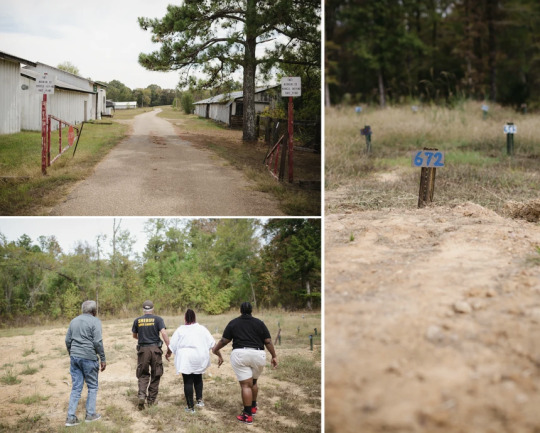
now, after the police neglectfully took this man's life, failed to inform his family, and attempted to cover it up... it turns out that his wallet with his home address, a credit card and a health insurance card was in the front pocket of his jeans at the time of his death.
this is after the Hinds County coroner's office reported that they did not find identification on Dexter Wade's body, but found his name on a bottle of prescription pills that they used to ID him several days later. undoubtedly, this was to provide police ample time to cover up their tracks.
the Mayor of Jackon, MS, Chokwe Antar Lumumba (a self-described Progressive, Socialist and "political revolutionary") said last month that Wade was "without ID" and that police were unable to identify him.
this is about to get, somehow, more fucked up.
in addition to the disrespect shown already to Dexter Wade, his family and his memory, officials from the State of Mississippi exhumed his body on Monday without his family in attendance.
On Monday, authorities exhumed Wade's body following calls for an independent autopsy and funeral. But his family said officials failed to honor the agreed-upon time approved by a county attorney for exhuming the body.
“Now, I ask, can I exhume my child and try to get some peace and try to get a state of mind,” Bettersten said. “Now y’all take that from me. I couldn’t even see him come out of the ground.”
Civil rights and personal injury attorney Ben Crump told USA TODAY Wade's mother was notified last week by the attorney for the Hinds County Board the exhumation would be at 11:30 a.m. Monday. The family, along with their attorneys, members of the media and community advocates had planned to attend, but Crump said Wade’s body was exhumed at 8 a.m., hours before the scheduled time and without notice.
“There is no excuse for the way this case has been handled. Every time Ms. Wade takes a step toward getting answers as to what happened to her son, Jackson officials bring her two steps back,” Crump said.
this is a heavy post. but as usual, the point here is: the institutions we currently in place throughout this country are corrupt, soulless and have no respect for you in life or death. the state and the police are corrupt and will kill you - intentionally or unintentionally - and then bury the evidence as deep as they possibly can. and the slime will insulate them from within. it's unacceptable. it cannot be reformed.
#us news#mississippi#dexter wade#black lives matter#civil rights#bork bork thoughts#united states#tw racism#tw police#tw death#acab#ftp#1312#all cops are bastards#fuck the police
85 notes
·
View notes
Photo

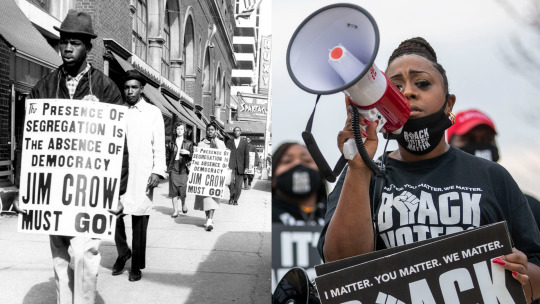
REPUBLICANS RESURRECTING JIM CROW IN MISSISSIPPISPECIAL TO THE ...MARCH 03,2023
Earlier this month, white representatives in the Mississippi House approved a bill to create a new district—that includes all of the majority-European neighborhoods in Jackson, a capital city that is 83 percent African. This includes creating a criminal justice system for the district, overseen by an all-European power base.
Under House Bill 1020, the white conservative chief justice of the Mississippi Supreme Court would handpick the new district’s two supervising judges; its prosecutors and public defenders would be chosen by the state’s white Republican attorney general.
The zone would be policed by an expanded Capitol Police force, led by the current European police chief, and supervised by the state’s Europan Public Safety commissioner. Because all the district’s officials would be appointed instead of elected, Jackson’s majority-African citizenry would have no voting rights on the matter—making it Mississippi’s only jurisdiction where, according to the ACLU, “unelected judges and prosecutors have jurisdiction over criminal and civil law matters”—although 12 percent of their sales taxes would be redirected to help pay for it all.
“It’s oppressive because it strips the right of African folks to vote,” Jackson Mayor Chokwe Antar Lumumba said, after the bill cleared the House. “It’s oppressive because it puts a military force over people that has no accountability to them. It’s oppressive because there will be judges who will determine sentences over people’s lives. It’s oppressive because it redirects their tax dollars to something they don’t endorse nor believe in.”
youtube
#kemetic dreams#chokwe natar lumumba#lumumba#african#europeans#jim crow#lawyer#hinds county#mississippi#south#racism
24 notes
·
View notes
Text
JACKSON, Miss. — A stray dog in Mississippi was seen carrying a severed arm on Saturday, prompting police to launch an investigation and pinpoint who the remains belong to.
The victim is 53-year-old Scott Allen Tyler, said Hinds County Coroner Sharon Grisham-Stewart.
A video of the dog carrying the arm in its mouth was shared online.
According to WAPT-TV, an ABC affiliate in Jackson, the body's arm was found on a street near the abandoned house but the head hadn’t been found as of Monday morning.
During the ensuing investigation, authorities discovered a decapitated body in a nearby abandoned house in the woods, said Deric Hearn, deputy Jackson police chief.
In Wisconsin:Nurse charged with amputating patient's foot without his consent or doctor's authorization
“That is a very graphic and brutal picture, the mutilation of a body," said Jackson Mayor Chokwe Antar Lumumba at a Monday news conference. "My reaction is one of disgust, is one of concern. It's not something you grow accustomed to. It's never something you want to grow accustomed to.”
The Jackson Police Department and the Hinds County Corner are still investigating the incident and had not located the head as of Wednesday afternoon.
Hearn also told WAPT-TV that the case is Jackson's 117th homicide this year.
10 notes
·
View notes
Text
KU KLUX COURT IN 2023 MISSISSIPPI: MS bill 1020 creates separate unelected court system in Jackson district

The passage of House Bill 1020 came in spite some of the starkest possible opposition from Jackson's mayor, its city council and its representatives in the House, many of whom said the bill reminded them of the darkest days of Mississippi's racist past.
After nearly five hours of debate on the House floor the chamber passed the bill that would create an unelected state-appointed court system within the city of Jackson, as conflict between the city and state continues to be one of the key themes of the 2023 legislative session.
The bill passed, 76-38, with only one member of the Jackson delegation supporting it.
More:What legislators said See some of the most explosive quotes from the House debate on unelected Jackson courts
If passed by the Senate and approved by the governor, the bill would create a new court system for cases occurring within the Capitol Complex Improvement District (CCID), an area that could expand.
The bill has faced significant criticism since it was first introduced last month.
Jackson Mayor Chokwe Antar Lumumba, who looked on from the House gallery during the debate, said last week that it "reminds me of apartheid."
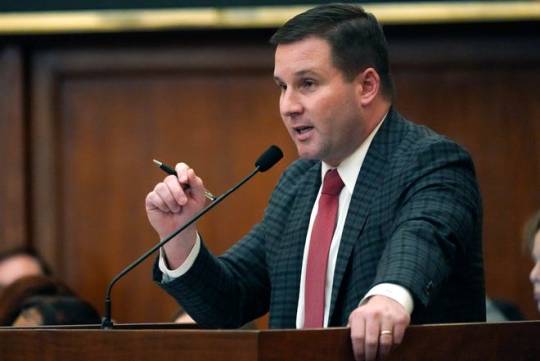
The Jackson City Council called a meeting Saturday to vote on a resolution opposing the bill. Every councilmember present, including the sole Republican, Ashby Foote, voted for the resolution.
As Rep. Trey Lamar, R-Senatobia, came forward to propose the bill Tuesday, he seemed to address the news headlines that his bill had made, saying Jackson has a crime problem and a judicial backlog that must be managed.
"I don't know what you've heard, I'll say that, but this bill is designed to help make our capital city of Mississippi a safer city. This bill is designed to assist the court system of Hinds County, not to hinder it. It is designed to add to our judicial resources in Hinds County, not to take away. To help, not to hurt," Lamar said.
Critics, including those elected by the people of Jackson, disagree. They say the bill is not wanted by Jackson residents or leaders within the court and that it dilutes the voting power of Jackson residents, violates the state constitution and does little to address root causes of crime.
"I have not heard that anyone from the City of Jackson, Mississippi who is an elected official is in favor of this," said Rep. Edward Blackmon, D-Canton. "This is a land grab, has nothing to do with crime."
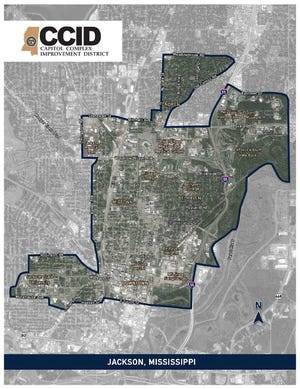
Lamar amended the bill, cutting it from more than 1000 pages down to less than 40 in the process, to remove provisions that would have given the new court sole jurisdiction over lawsuits involving the state.
Blackmon, speaking against that amendment, said the new court would oversee both civil and criminal cases, and that should be a sign to observers that the true underlying issue is not about crime.
"This bill is about helping to fight crime?" Blackmon said. "What does civil litigation have to do with crime in the state of Mississippi?"
If the state was serious about fighting crime in Jackson, Blackmon said, it would increase funding for the state crime lab, which has been cited by law enforcement leaders as a key cause of backlogs.
"I notice that this bill does not address part of the problem, which is lack of funding at that crime lab. You're blaming Jackson because they can't process their cases fast enough because the crime lab is not operating at capacity because we won't give them the money," Blackmon said.
Democrats proposed eight amendments to Lamar's amendment, including ones to make CCID judges elected and to require they be residents of Hinds County. The one amendment that did succeed, proposed by Rep. Cheikh Taylor, D-Starkville, would require Capitol Police officers to wear body cameras. The department's officers were involved in more than a dozen shootings last year.
"This amendment is all about protection, furthering the protection of civilians and also police officers. For those that are in favor of this bill, it does the bill no violence. For those opposed to this bill, it gives further protections to citizens who may be under duress from officers who may not be held accountable because there is no video footage," Taylor said.
After discussions between Taylor and Lamar, language mandating the firing of officers that do not wear the cameras was removed, and the amendment succeeded via vioce vote.
Lamar's response to the amendment to make the judges Hinds County residents, which was proposed by Rep. Robert Johnson, D-Natchez, drew the ire of many of the chamber's Black members.
"If we're going to make an additional court in the city of Jackson, do we not want our best and brightest sitting in judgment, whether that may come from Holmes County or Madison County or wherever they may be? Why would we limit the talent pool to here?" Lamar said.

"What does it imply when you say have a city of 83, that's 83% African American, when you have a statement made from that podium that the desire, the reason you want to go outside of Jackson, is because you want to have the 'best and brightest' in the state?" Blackmon asked.
"What is says to me is, maybe because you've got a Black County with Black judges, maybe they might not be the best and the brightest. Well, I will tell you, I disagree," Johnson said. "They've got the same training, the same education, (and they) probably had to work a little harder to get it."
Hours later, when the statement was brought back up, Lamar said he had been "misconstrued."
"That's not what I'm saying at all. The best person for the job may very well come from Hinds County, and if so the supreme court can appoint that person," Lamar said.
Lamar lives more than two hours away. He repeated a belief from the House floor Tuesday that, as the capital city, Jackson doesn't just belong to the citizens of Jackson.
"The city of Jackson is the capital city of the state of Mississippi, whether you are from Southaven or Gulfport. It is our capital city. It does not belong solely to the citizens of Jackson, OK?" Lamar said.
Lamar said there are already unelected judges serving over cases in Hinds County, but those judges are funded by expiring federal funds from the American Rescue Plan Act, and this is an attempt to more permanently address the problem.
"Why wouldn't you just provide more money to the existing court system to reduce the backlog?" Rep. Zakiya Summers, D-Jackson, asked Lamar.
"Lady, this is the bill that's before the body," Lamar responded.
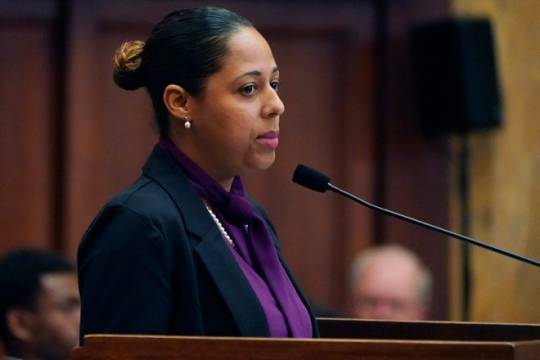
Summers later pointed out that the current appointed judges are overseen by elected Hinds County judges, and not state officials. She said Lamar's bill would create a "separate but unequal court."
A later question, from Rep. Tracey Rosebud, D-Tutwiler, asked why the legislature should take away authority from Hinds County judges. Lamar said he does not see it that way because the two courts would have concurrent jurisdictions, meaning the Hinds County District Attorney could file cases within the CCID, and CCID prosecutors could file cases within the county courts.
"If the prosecutor wants to indict someone in Hinds County Circuit they still have the ability to do that," Lamar said.
Rep. Christopher Bell, D-Jackson, asked Lamar to name people from Hinds County he had spoken with about the legislation. Lamar said there are several residents he has spoken to.
"Do they look like me?" Bell asked. "You don't have to answer that."
"All God's children are unique. We're all God's children," Lamar responded.
Once Lamar had finished taking questions, it was time for members of the body to speak on the bill. One by one, 12 Black Democrats rose to urge their colleagues to vote no. Other than Lamar, no one spoke in support of the bill.
Blackmon, who recalled being jailed as a younger man for seeking the right to vote, told lawmakers that this moment called back to the state's infamous past.
"Only in Mississippi would we have a bill like this, with our history, where you say solving the problem is taking the vote away from Black people because we don't know how to choose our leaders. That's the problem. And the Trojan Horse that has been brought forward in this bill is called crime," Blackmon said. "I'm old enough to know and understand that the right to vote has not always been ours, and perhaps I'm a little more sensitive to the idea that that vote can be taken away."
Blackmon was one of many lawmakers to claim the bill is unconstitutional.
"This bill is going to pass, make no mistake about it. We'll be back in federal courts again doing what we were doing in the 60s and the 70s, to regain our rights again," Blackmon said.
Rep. Solomon Osborne, D-Greenwood, also thought back to the days of Jim Crow.
Black caucus:How the Mississippi Legislative Black Caucus has changed, served members over the years
Will Jackson lose control of its water?Here's what you should know about state efforts to regionalize the Jackson water system
Mayoral veto bill:Bill saying mayors cannot veto no votes gets initial approval, amid Jackson trash fight
"I've been here for 74 years and one thing I can do is recognize a racist when I see one ... racist actions when I see them, and this is a racist bill," Osborne said, to cheers from those in the gallery, which were quickly gaveled down by House Speaker Pro Tempore Jason White, R-West.
"People come up with all kinds of measures to take away our rights and to oppress the Black Folks in Mississippi. I don't even know why I'm down here, frankly, because it's like being at a Klan rally with people with suits on. That's the only difference I see between these people here. They wear suits rather than sheets," Osborne said. "Every day we get up here and open this body with prayer. I wonder what God are these people praying to?"

"We don’t talk about race because it’s convenient. We talk about race because it’s factual," Johnson said.
Rep. John Hines, D-Greenville, said the legislature needs to do more to support people in need if it wants to see crime decrease.
"If you really want Jackson safe, put the resources in place where we can put mental health services in place, where we can have quality housing for people, where we can insure and where can make so kids got somewhere to go and play and something to do. We ain't doing it. We have not done it at all," Hines said.
Hines went on to say that this action will only reinforce Mississippi's poor reputation on race.
"Again, we end up being the laughingstock of America because of what we do here today," Hines said.
Johnson said actions taken against Jackson stand in stark contrast to what state legislature has done regarding white collar crimes, particularly the massive welfare fraud scandal uncovered in recent years.
"The people who did the wrong were white. Stole $95 million from poor children, and this body hasn't said one time, 'Let's take over that agency and make it work right. Let's take those people out of office, take the power that they have to run that agency and take it and put it in the hands of the legislature so it can be done right.' And the only difference we see is they're white, and the mayor and the city council and the supervisors in Hinds County are Black," Johnson said.
Rep. Earle Banks, D-Jackson, addressed Lamar's comments about to whom the capital city belongs.
"This is your capital city, as many of you say, but this is my home," Banks said.

"I'm going to speak to the citizens and the voters of the city of Jackson. We may lose the battle today, but I want you to know that the people of your Hinds County delegation have been fighting very hard against this bill. The victory belongs to God. We have elections coming up this year. Keep in mind what happens today," Summers said.
As Lamar again rose to the podium following the onslaught of criticism, he promised to keep it brief, noting that every Democrat in the chamber voted to create the CCID in 2017. He flatly denied any racial motivation behind the bill.
"So, I get the fun job of having to close after all that. Where in the world do I start?" Lamar said. "I'm not going to holler and scream and put on a show."
The only member from Jackson to vote for the bill was independent Shanda Yates, whose district includes a small part of Northeast Jackson along with areas in Madison County.
Though it would have cleared either bar, a procedural decision ruled that it could pass by a simple-majority, despite the Legislature's website initially stating it would require a three fifths vote.
It now heads to the Senate. During a January news conference, Republican Lt. Gov. Delbert Hosemann said he could see the bill reaching the Senate floor, though at the time he had not yet read it or spoken with Lamar.
Democrats in that chamber have also vowed to oppose the bill.
#Jackson Mississippi#Voter Disinfranchisement#seperate and unequal#Hinds County#MS bill 1020 creates separate unelected court system in Jackson district
5 notes
·
View notes
Text
Severe Storms Cause Damage and Disruption Across Mississippi

Gov. Tate Reeves reports injuries and damage as storms sweep through the state
Mississippi experienced severe storms on Thursday night, resulting in injuries, damage to homes and public property, and widespread power outages. Governor Tate Reeves took to social media to provide updates on the situation, while the National Weather Service investigates possible tornadoes in several counties. Jackson Mayor Chokwe Antar Lumumba declared a state of emergency in the city due to the extensive damage.
JXN Water issued a boil-water notice, and both Jackson Public Schools and Pelahatchie schools were closed due to storm-related issues. As the state begins the process of recovery, residents are urged to stay informed and take necessary precautions.
youtube
Gov. Tate Reeves reports injuries and damage
On Friday morning, Governor Tate Reeves shared updates on the storm's impact on social media. He confirmed one injury in Rankin County and stated that the Mississippi Emergency Management Agency (MSEMA) was assisting local emergency managers with damage assessments. Preliminary reports indicated that homes were damaged in Lowndes and Rankin County, with additional damage expected as assessments continue.
Jackson Mayor declares state of emergency
Jackson Mayor Chokwe Antar Lumumba declared a state of emergency in the city on Friday afternoon. The declaration was made in response to the severe storm system that caused widespread damage to homes, businesses, and public property, posing a threat to the health, safety, and welfare of Jackson residents. The state of emergency will be reviewed every seven days until the local emergency is no longer in effect.
All agencies and departments of the City of Jackson are ordered to provide assistance and implement emergency protocols.
Winds topping 60 mph recorded in Jackson
The storm brought strong winds to Mississippi, with recordings of winds topping 60 mph in Jackson. Alan Campbell, a meteorologist from the National Weather Service in Jackson, reported wind speeds of 62 miles per hour at their office and 59 miles per hour at Hawkins field. The winds caused significant damage, and it is believed that other areas experienced even stronger gusts.
The extent of the damage caused by the high winds is still being assessed.
JXN Water issues boil-water advisory
JXN Water, the water utility provider for Jackson, issued a boil-water notice following a power outage at the O.B. Curtis Water Treatment Plant. Although power has been restored, the system requires time to recover, and some areas may experience longer delays.
Customers who receive water from wells are not affected by the advisory. JXN Water urges residents to conserve water and boil it until further notice.
Jackson Public Schools and Pelahatchie schools closed
Due to low water pressure caused by a storm-related power outage at the O.B. Curtis Water Treatment Plant and power outages in the city, Jackson Public Schools announced the closure of all schools on Friday. Students who were already picked up by buses will remain at school under supervision until they can be safely returned home.
Pelahatchie Elementary School and Pelahatchie High School also closed due to power outages in the area. The restoration of power is currently unknown.
The severe storms that swept through Mississippi on Thursday night left a trail of damage and disruption. Governor Tate Reeves provided updates on injuries and damage, while Jackson Mayor Chokwe Antar Lumumba declared a state of emergency in the city. The National Weather Service is investigating possible tornadoes in several counties.
JXN Water issued a boil-water notice, and both Jackson Public Schools and Pelahatchie schools were closed due to storm-related issues. As the state begins the recovery process, it is crucial for residents to stay informed, follow safety guidelines, and support one another during this challenging time.
0 notes
Text
Severe Storms Cause Damage and Disruption in Mississippi

Governor Reports Injuries and Damage Across the State
Severe storms swept through Mississippi on Thursday night, causing widespread damage and disruption. Governor Tate Reeves took to social media to report one injury in Rankin County and preliminary damage assessments in Lowndes and Rankin County. The National Weather Service is currently investigating possible tornadoes in Clarke, Hinds, and Lauderdale counties.
The city of Jackson also declared a state of emergency due to the extensive damage caused by the storm. The following is a comprehensive report on the aftermath of the storm and its impact on various aspects of life in Mississippi.
youtube
Jackson Mayor Declares State of Emergency
Following the severe storm system that caused widespread damage to homes, businesses, and public property, Jackson Mayor Chokwe Antar Lumumba declared a state of emergency in the city. The declaration aims to address the threats to the health, safety, and welfare of Jackson residents. The state of emergency will be reviewed every seven days until the local emergency is no longer in effect.
All agencies and departments of the City of Jackson are ordered to provide assistance and implement emergency responsibilities and protocols.
Wind Damage Recorded in Jackson
The storm brought strong winds to Mississippi, with reports of gusts reaching over 60 mph. Alan Campbell, a meteorologist from the National Weather Service in Jackson, stated that winds of 62 mph were reported at their office and 59 mph were observed at Hawkins field. The winds caused a swath of damage, with speeds ranging from 50 to 70 mph.
It is likely that some areas experienced even stronger winds. The extent of the damage caused by the powerful winds is still being assessed.
Boil-Water Advisory Issued by JXN Water
JXN Water, the water utility company in Jackson, issued a boil-water advisory due to a power outage at the O.B. Curtis Water Treatment Plant. Although power has been restored, the system requires time to recover fully.
Some areas may experience longer recovery times. Customers who receive water from wells are not affected by the advisory. JXN Water urges customers to conserve water and boil it until further notice to ensure safety.
Jackson Public Schools Closed
As a result of low water pressure caused by a storm-related power outage at the O.B. Curtis Water Treatment Plant and citywide power outages, all Jackson Public Schools will be closed on Friday. Students who have already been picked up by buses will remain at school under supervision until they can be safely returned home.
Officials will continue to monitor the situation and provide updates on the reopening of schools.
Pelahatchie Schools Also Closed
Pelahatchie Elementary School and Pelahatchie High School are closed on Friday due to the aftermath of the storm. Power outages in the area have affected both schools, and it is currently unknown when power will be restored. Rankin County, where Pelahatchie is located, reported over 19,000 power outages as of Friday morning.
The restoration of power is a top priority to ensure the safe reopening of schools.
The severe storms that hit Mississippi on Thursday night caused significant damage and disruption across the state. Governor Tate Reeves reported injuries and damage in Rankin County, while the National Weather Service investigates possible tornadoes in several counties. The city of Jackson declared a state of emergency to address the widespread damage to homes, businesses, and public property.
JXN Water issued a boil-water advisory, and both Jackson Public Schools and Pelahatchie Schools closed due to storm-related issues. The recovery and restoration efforts are ongoing, and officials will continue to provide updates as the situation develops. Mississippians are urged to stay safe and take necessary precautions during this challenging time.
0 notes
Text
Aired March 9, 2023
Mississippi’s Republican majority in the state Legislature has put forth a slew of bills in recent months to put the majority-Black capital of Jackson under a white-led superstructure. Under the proposed bills, the Capitol Police would be expanded and given greater authority over much of Jackson without being accountable to local leaders or residents, and a separate court system would be set up in the city, composed of judges appointed directly by white state officials. This comes after Jackson suffered a number of water crises in recent years stemming from systematic disinvestment by the state, and after the federal government approved $600 million late last year to address the city’s infrastructure problems. “These bills are an attack on Black leadership, a way to seize power of a majority-Black city which cannot be seized democratically through an election,” says Jackson Mayor Chokwe Antar Lumumba. We also speak with community activist Makani Themba, who described the state’s plans in a recent piece for The Nation as “Apartheid American-Style.”
#voting rights#history#white history#Black History#republicans#democrats#mississippi#jackson mississippi
0 notes
Text
215 People Have Been Buried Behind a Mississippi Jail Since 2016, Attorney Says
— January 12, 2024 | By Bill Chappell | NPR

Hundreds of people are buried in numbered graves in a pauper's graveyard near the Hinds County Detention Center and Hinds County Penal Farm. Families say their loved ones were buried there without notice. Google Maps/Screenshot by NPR
Families of people who were buried in a pauper's field next to the Hinds County Penal Farm near Jackson, Miss., are calling for a federal investigation into the burials, which took place without families being notified. With their attorney now saying the field holds hundreds more graves, the families want a full accounting of the bodies buried there.
The issue became national news last fall, when several families said they had waited months to hear about a missing loved one — only to learn their relative had died months earlier, and were buried in a grassy field, their graves marked only by a metal tag bearing a number. Their attorney, civil rights lawyer Ben Crump, says he believes many more people were buried under similar circumstances.
"We know, based on the records from the coroner's office, that, since 2016, in the last eight years, we can identify 215 individuals that were buried behind that jail, and their families have not been notified," Crump told PBS NewsHour this week.
When NPR contacted officials in Jackson to ask about Crump's allegation, Melissa Faith Payne, the city's director of communications, said the bodies were buried in a pauper's graveyard managed by Hinds County.

"It is not a secret burial ground," she said. "In those graves are the bodies of those who went unclaimed by family when they died. These persons are either homeless people, inmates from local jails who died but relatives never claimed their bodies, unidentified persons who officials were never able to connect with family, or even persons who died" whose families couldn't afford a funeral.
A Mother's Grief Drew Wide Attention Last Fall
Last October, Bettersten Wade told NBC News the anguishing story of how, months after she filed a missing persons report about her son, Dexter Wade, she was finally told that her son was dead at age 37. The police also told her that county officials had buried him in the local pauper's field, she said.
Police investigators said Dexter Wade had been struck and killed by an SUV driven by an off-duty Jackson Police Department officer on Interstate 55, just hours after his mother last saw him. The police report said Wade was on foot at the time.
"The accident was investigated and it was determined that it was in fact an accident and that there was no malicious intent," Mayor Chokwe Antar Lumumba said last October.
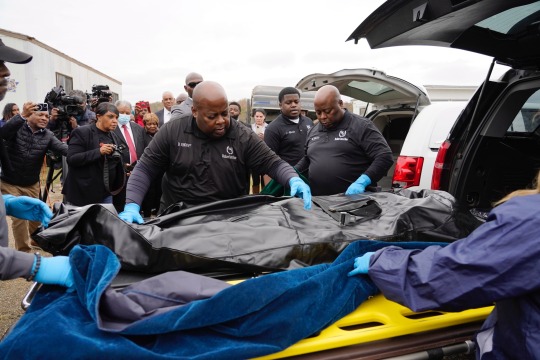
But, Lumumba added, officials had failed to inform the Wade family. "There was a lack of communication with the missing persons division, the coroner's office, and [the police department's] accident investigation" unit, he said.
By the time Bettersten Wade learned her son's fate, she had spent months looking for him, contacting police in Jackson, giving them potential leads and asking for any updates about where her son might be. She also asked for help on social media to find him.
"I just couldn't believe that he had disappeared off the face of Earth and nobody knows where" he was, she told NewsHour.
It turned out that Dexter Wade had a prescription medicine bottle with his name on it in his pocket when he died. Within days of his death, the Hinds County Coroner's office was able to confirm his identity and share that information with police. But somehow, Jackson police were unable to inform Wade's mother until last August.
Questions Persist Over Burials
When Wade's family finally recovered his body, their attorney said that an independent examination found that the jeans he was buried in held a wallet, which contained his state ID, a credit card and other identifying information.
"The fact that Dexter had a state identification card and several other identifying items shows us that there was a concerted effort to keep the truth and manner of his death from his family," Crump said, according to member station Mississippi Public Broadcasting. "There is no excuse, not even incompetence, for not notifying a next of kin of an identified man's death."
Since the Wade family struggled to find Dexter, Payne said, the Jackson Police Department has changed its policy to improve how it informs a deceased person's next-of-kin.


Families of MS Men Buried in Pauper's Grave Without Their Knowledge
At least two other families are known to have been informed they have relatives buried in the field. In the case of a man named Marrio Moore, 40, the lag in communication was compounded by another issue: the Jackson Police Department's initial failure to disclose more than 20 homicides that took place over the course of 2023. In October, when the agency finally released the names of people who had been killed, Moore's family was shocked to see his name on the list — and to learn he had been killed on Feb. 2, and buried in the same field as Dexter Wade.
"It is tragic to suffer the consequences of having to bury your child before you perish," Lumumba said last fall. "But to add insult to that trauma, it is even more difficult to not have the ability to have a proper burial for your child."
The mayor said his administration regrets what the Wade family endured. At the same time, he emphasized that an investigation did not reveal police misconduct or malicious intent.



Left: A photograph of Dexter Wade rests adjacent to a wreath of flowers at his funeral service in Jackson, Miss., Monday. Right: Bettersten Wade, mother of Dexter Wade, cries as she leaves a rose on her son’s coffin in Jackson, Mississippi. Dexter Wade, a 37-year-old man who died after being hit by a Jackson police SUV driven by an off-duty officer, was initially buried in a paupers cemetery without any notification to his family. Bottom: A church usher holds a funeral service program with an image of Dexter Wade prior to his funeral services in Jackson, Mississippi, Monday November 20, 2023. (Photographs: Rogelio V. Solis/The Associated Press)
But weeks after that statement, the Wade family was confronted with another hardship, when Dexter Wade's remains were finally exhumed from the pauper's grave.
Hinds County officials had informed Bettersten Wade that her son's body would be exhumed and transferred to a funeral home on Nov. 13, in a process that would begin at 11:30 a.m. After months of uncertainty, the event promised a moment of closure. But as Mississippi Public Broadcasting reported, when Wade arrived at the field, she learned her son's body had been dug up hours earlier, at 8 a.m.
"As Dexter's body was transferred from the coroner's SUV to the funeral home's van, Bettersten stared blankly into the black bag holding her son's remains and asked why they couldn't have at least buried him in a box," MPB reported.
#NPR.Org#Mississippi Jail#Burials 🪦 🪦 🪦#National News 🗞️#Jackson Mississippi | Police Brutality | Policing | Poverty | Racism | US 🇺🇸 South
0 notes
Text

DAILY BEAST
CHEAT SHEET
NEWSLETTERS
LOG IN
CHEAT SHEET
POLITICS
Fever Dreams
Biden World
Elections
Opinion
National Security
Congress
Pay Dirt
The New Abnormal
Trumpland
MEDIA
Confider
Daytime Talk
Late-Night
Fox News
U.S. NEWS
Identities
Crime
Race
LGBT
Extremism
Coronavirus
WORLD
Russia
Europe
China
Middle East
INNOVATION
Science
TRAVEL
ENTERTAINMENT
TV
Movies
Music
Comedy
Sports
Sex
TDB's Obsessed
Awards Shows
The Last Laugh
CULTURE
Power Trip
Fashion
Books
Royalist
TECH
Disinformation
SCOUTED
Clothing
Technology
Beauty
Home
Pets
Kitchen
Fitness
I'm Looking For
BEST PICKS
Best VPNs
Best Gaming PCs
Best Air Fryers
COUPONS
Vistaprint Coupons
Ulta Coupons
Office Depot Coupons
Adidas Promo Codes
Walmart Promo Codes
H&M Coupons
Spanx Promo Codes
StubHub Promo Codes
Products
NEWSLETTERS
PODCASTS
CROSSWORDS
SUBSCRIPTION
GOT A TIP?
MY ACCOUNT
MANAGE NEWSLETTERS
SUBSCRIPTION OFFERS
NEED HELP?
LOG OUT
OPINION
Jim Crow Is Resurrected in Mississippi
DID WOKENESS DO THIS?
Kali Holloway
Updated Feb. 27, 2023 3:42AM ET Published Feb. 26, 2023 9:14PM ET
OPINION
Photo Illustration by Thomas Levinson/The Daily Beast/Reuters
Earlier this month, white representatives in the Mississippi House approved a bill to create a new district—that includes all of the majority-white neighborhoods in Jackson, a capital city that is 83 percent Black. This includes creating a criminal justice system for the district, overseen by an all-white power base.
Under House Bill 1020, the white conservative chief justice of the Mississippi Supreme Court would handpick the new district’s two supervising judges; its prosecutors and public defenders would be chosen by the state’s white Republican attorney general.
Advertisement
The zone would be policed by an expanded Capitol Police force, led by the current white police chief, and supervised by the state’s white Public Safety commissioner. Because all the district’s officials would be appointed instead of elected, Jackson’s majority-Black citizenry would have no voting rights on the matter—making it Mississippi’s only jurisdiction where, according to the ACLU, “unelected judges and prosecutors have jurisdiction over criminal and civil law matters”—although 12 percent of their sales taxes would be redirected to help pay for it all.
“It’s oppressive because it strips the right of Black folks to vote,” Jackson Mayor Chokwe Antar Lumumba said, after the bill cleared the House. “It’s oppressive because it puts a military force over people that has no accountability to them. It’s oppressive because there will be judges who will determine sentences over people’s lives. It’s oppressive because it redirects their tax dollars to something they don’t endorse nor believe in.”
State Rep. Trey Lamar, the white Republican who sponsored the bill, lives in and represents a majority-white district more than two hours away from Jackson. (He holds a seat once held by his grandfather, Leon Hannaford, whose legacy includes introducing a 1962 bill to tighten residency requirements for college students, which a local paper at the time reported, “would have kept Negro James Meredith from filing suit to enter the University of Mississippi.”) In various statements on the House floor and in an op-ed from last weekend, the legislator has insisted that HB 1020, by adding unelected judges to Hinds County’s courts, will help clear up lengthy case backlogs, while an expanded Capitol Police force will address a spike in crime in Jackson, allowing his constituents to “feel safe when they come” to the capital.
Advertisement
“Black House Democrats rightly compared the bill to Mississippi’s 1890 Constitution, which was drafted explicitly to ‘exclude the Negro’ from voting through sinster methods of black disenfranchisement.”
Calling the bill “racially neutral,” he suggested Jackson’s Black elected representatives, who overwhelmingly rejected the legislation, have “used race” as some kind of political maneuver, and has even gone so far as to accuse those same black officials of “incompetence in leadership.”
Advertisement
If it’s not already obvious already, there’s really only one way to describe an effort to create a white political stronghold in America’s second blackest city, where the Black majority is subject to taxation without representation—and that is, “trying to pull a Jim Crow.”
But it’s not just the top-down white supremacist power structure the bill proposes that begs the Jim Crow comparisons. It’s also the overtly racist subtext needed to justify the idea that white power is the natural “solution”—an assumption so frequently made, it’s recognizable between all those lines of “racially neutral” language. (At the suggestion of an amendment to ensure his bill’s unelected judges at least be from Jackson, Lamar suggested the search not be limited to the majority-Black city, asking, “Do we not want our best and brightest sitting in judgment?”)
Advertisement
Black House Democrats rightly compared the bill to Mississippi’s 1890 Constitution, which was drafted explicitly to “exclude the Negro” from voting through sinster methods of Black disenfranchisement. But the toppling of Reconstruction, in Mississippi as elsewhere, was also driven by the white supremacist assumption of Black incompetence, intellectual unfitness, and innate inadequacy, ideas fabricated to cast Black folks as incapable of leading. One Mississippi delegate would later write that the goal of the state’s constitutional convention had been “to adopt some provision in our organic law which would serve to the State a good and stable government, freed from…negro rule from which we had suffered” and to “remove from the sphere of politics in the state the ignorant and unpatriotic negro.”
For nearly a century, the white racist recollection of Reconstruction would redact and overwrite history, smearing Black leaders as inherently unfit to hold office, and falsely portraying the reestablishment of absolute white authority as a necessary intervention and saving grace.
Perhaps this history is lost to Mississippi’s current white legislators, but that seems unlikely considering the effort they’ve put into scrubbing it from textbooks. (Ditto the fact that “no Black official has held” any of the designated shot-calling positions—attorney general, chief justice of the Supreme Court—nor “any statewide elected office since the brief period of Reconstruction after the Civil War, which ended due to white terrorism to block Black voting power,” the Mississippi Free Press reported.)
Apartment complexes and neighborhoods in the southern part of the capital city in Jackson, Mississippi.
Rory Doyle/Reuters
Advertisement
Mississippi Today reports that during the four-hour debate over the bill, as “Black House members were doing all they could to plead with the humanity of their GOP colleagues, a large number of Republicans left the House floor altogether for a majority of the debate, reappearing from the back halls of the Capitol to cast a final ‘yea’ vote.” Lamar, apparently indifferent, “sat behind the well and scrolled his phone.”
And yet, Lamar keeps saying that HB 1020 is a “good faith effort at helping the people” of Jackson and Hinds County, but it sure seems like the same tired narrative of the “civilizing” power of whiteness being used to save “uncivilized” Blackness from itself.
What’s more, this sudden compulsion to help by takeover—framed almost as charitable giving, in debate over the bill—comes after years of apparently feeling unmoved. Both Lamar and Gov. Tate Reeves used the language of “incompetence” when indicting Jackson’s Black leaders about the recent water crisis, but Jackson’s leaders had already pleaded for funds from Mississippi’s legislative supermajority, only to be repeatedly shortchanged. Jackson city schools have long been underfunded, an issue that was exacerbated by 2013’s Charter Public Schools Act, but instead of correcting the problem, a takeover was again proposed as a logical solution. And during this legislative session, instead of organizing a hostile takeover, the legislature could vote to expand Medicaid, which would do far more to aid Black Jacksonians than stripping their voting rights could even pretend to. But so far, Mississippi’s legislative majority seems uninterested in providing that sort of help.
Advertisement
Makes you wonder where the ineptitude truly lies.
“If it’s not already obvious already, there’s really only one way to describe an effort to create a white political stronghold in America’s second blackest city, where the black majority is subject to taxation without representation—and that is, ‘trying to pull a Jim Crow.’ ”
If HB 1020 isn’t an attempt at a “land grab,” as Democratic Rep. Ed Blackmon called it, then why does the bill not simply seek to fund more permanent elected judges to Hinds County and Jackson’s courts, instead of diverting tax money to a whole new district? If criminal cases have surged in tandem with Jackson’s crime surge, thus creating the backlog that Lamar wants to address, then why are the unelected judges of HB 1020 also going to be handling civil cases, to re-pose another question from Blackmon? (Especially since, in his op-ed self-defense, Lamar notes that Hinds County District Attorney Jody Owen stated that “our current judges are working really hard, but they have half civil and half criminal dockets.”)
Mississippi’s crime lab has been underfunded, understaffed, and under-equipped for years—contributing to backlogs in Jackson’s courts and all around the state—and yet Lamar’s bill does nothing to address long-standing appeals from lab staffers to address any of those issues. Overlooking these problems doesn’t seem like a good way to address Jackson’s criminal court case backlogs, unless what you were really trying to do was to create yet another entrenched white power system in the state.
Advertisement
Mississippi’s Capitol Police officers reportedly shot more people in 2022 than any other Mississippi law enforcement department, with the most recent shooting occurring in December. The department’s fatal police shooting of 25-year-old Jaylen Lewis in September is still under investigation by the Mississippi Bureau of Investigation. At a meeting between the police chief and public safety officers, Black residents expressed concerns that Capitol officers don’t know “how to deal with Black people in Black neighborhoods,” and fears that most of the force’s officers are from counties “known for their racial prejudice.”
While the new Capitol District will still be majority Black, it will also include 80 percent of Jackson’s white residents, and guess whose property rights will be prioritized over all else, including certain folks’ lives? Nevermind Capitol Police lack an “oversight board or standard requirements around transparency of reporting regarding officer-involved shootings,” as Jackson-based organizer Makani Themba wrote for The Nation.
Just as Lamar wants his constituents to “feel safe when they come” to the capital, Black Jacksonians want to feel safe, too, both from crime and from over-policing. It’s a concern the legislator blithely dismissed by stating, “if you're not committing crimes in Jackson, you really don't have anything to worry about.”
Advertisement
That’s quite a statement from someone with deep roots in a state notorious for creating the first Black Codes, having the most racial terror lynchings, having a Senate that voted to ship its Black residents to Africa at the late date of 1922, which created the first White Citizens' Council, which removed the Confederate flag from its banner in 2020, and which attempted to ban the teaching about all of those things with a bill that erroneously calls it “critical race theory.”
In 2023, the Mississippi House passed a bill that would essentially resurrect Jim Crow; now that proposed law will head to the Senate, where Republicans also retain majority power. Perhaps Mississippi will become the first state to so openly reinstate Jim Crow, extracting Black power in every form it can, yet again. And others will undoubtedly follow.
DAILY BEAST
ABOUT
CONTACT
TIPS
JOBS
ADVERTISE
HELP
PRIVACY
CODE OF ETHICS & STANDARDS
DIVERSITY
TERMS & CONDITIONS
COPYRIGHT & TRADEMARK
SITEMAP
BEST PICKS
COUPONS
Dick's Sporting Goods Coupons
HP Coupon Codes
Chewy Promo Codes
Nordstrom Rack Coupons
NordVPN Coupons
JCPenny Coupons
Nordstrom Coupons
Samsung Promo Coupons
Home Depot Coupons
Hotwire Promo Codes
eBay Coupons
Ashley Furniture Promo Codes
© 2023 The Daily Beast Company LLC
1 note
·
View note
Text
Mississippi lawmakers stop effort to take over Jackson water | AP News
But, the Republican-controlled state Legislature is still considering proposals to appoint rather than elect some judges and to expand the territory of a state-run police department inside Jackson, which is governed by Democrats.
Mayor Chokwe Antar Lumumba has sharply criticized white lawmakers’ attempts to assert state control in Jackson, which has the highest percentage of Black residents of…
View On WordPress
0 notes
Text
HIGHLIGHTS FOR ABC NEWS’ ‘GMA3: WHAT YOU NEED TO KNOW,’ FEB. 27-MARCH 3

The following report highlights the programming of ABC’s “GMA3: What You Need to Know” during the week of Feb. 27-March 3. “GMA3: What You Need to Know” is a one-hour news program that airs weekdays at 1:00 p.m. EST | 12:00 p.m. CST on ABC, and 4:00 p.m. and 6:00 p.m. EST on ABC News Live.
Highlights of the week include the following:
Monday, Feb. 27 — Mayor Chokwe Antar Lumumba on Mississippi water crisis; Tennessee State Representative Justin J. Pearson; ABC News senior Washington reporter Devin Dwyer on student loans; musician and director Moby (“Punk Rock Vegan Movie”)
Tuesday, Feb. 28 — “Women Behind the Lens” series with Oscars®’ hair and makeup; remembering the first Black-owned television station with Alex Perez; beauty expert Milly Almodovar; ABC News foreign correspondent James Longman interviews cast of “The Banshees of Inisherin”
Wednesday, March 1 — “Women Behind the Lens” series on “Elvis”; clinical psychologist Dr. Shefali Tsabary (“The Parenting Map”); Deals and Steals with ABC e-commerce editor Tory Johnson; actors Ke Huy Quan, Jamie Lee Curtis and Stephanie Hsu (“Everything Everywhere All at Once”)
Thursday, March 2 — “Women Behind the Lens” series with costume designer Ruth E. Carter; medical doctor and nutrition expert Dr. Amy Shah with a cooking demo (“I’m So Effing Hungry”); royal superfan Donna Werner; producer Jerry Bruckheimer (“Top Gun: Maverick”)
Friday, March 3 — “Women Behind the Lens” series with screenwriters Sarah Polley and Lesley Paterson; Faith Friday with author Lysa TerKeurst (“Good Boundaries and Goodbyes”); a performance by New Edition
ABC Media Relations
Brooks Lancaster
[email protected]
-- ABC --
0 notes
Text
Mississippi Today: Bills aimed at Jackson remind of apartheid, Lumumba says

Mayor Chokwe Antar Lumumba, with City of Jackson Communications Manager Melissa Payne, fields questions during a community meeting held to update the public on the water system, Tuesday, Sept. 14, 2022, at College Hill Missionary Baptist Church. Credit: Vickie D. King/Mississippi Today
Jackson Mayor Chokwe Antar Lumumba on Monday lambasted state lawmakers’ ongoing attempts to strong-arm city leadership through legislation that would remove local control over judicial and drinking water systems.
In the current legislative session, lawmakers have introduced the following bills:
HB 1020, which would create a new court to oversee cases within Jackson’s Capital Complex Improvement District with judges appointed by the state Supreme Court and prosecutors appointed by the state attorney general.
HB 696, which would expand the boundaries of the the district.
SB 2889, which would put the long-term control of Jackson’s drinking water system under a board mostly appointed by the governor and lieutenant governor.
SB 2338, which would prevent cities from charging for water based on property value, a plan Jackson’s new third-party manager is proposing as a way to lower the cost burden on poorer residents.
The mayor spoke to the pattern of recent attempts to remove control over issues in Jackson from the 83% Black, majority Democrat city, and put it in the hands of state leaders; all of Mississippi’s statewide elected officials are white Republicans.
“It reminds me of apartheid,” Lumumba said Monday. “They are looking to colonize Jackson, not only in terms of them putting their military force over Jackson, but also dictating who has province over decision-making.
“They put this military force over us, and we’re just supposed to pay taxes to the king.”
Lumumba also called out HB 370, which would allow voters to recall municipal elected officials. Critics of the bill argue it was aimed at removing Jackson leadership, although the bill’s author, Rep. Shanda Yates, said she didn’t introduce it with the city in mind.
The mayor has frequently criticized the role of state leaders over the past year. Last April, Lumumba called the Legislature “paternalistic” and “racist” after a dispute over the appropriation of federal funds from the American Rescue Plan Act. In their handling of the funds, lawmakers attached extra oversight over Jackson’s spending of infrastructure money that wasn’t required for other cities in the state.
Last fall, after a combination of flooding and broken pumps shut down the capital city’s drinking water system, Gov. Tate Reeves announced that the state was taking over Jackson’s water operations. After both initially said that the city and state were working together, Reeves and Lumumba spent weeks launching public attacks against each other.

The federal government recently appropriated $600 million to directly assist Jackson’s water system; that money is part of a total $814 million in federal funds that will go towards the city’s water and sewer projects.
Lumumba said Monday there has never been an investment like this before, referencing that Flint received $100 million in federal funds to aid its lead crisis. He said Lt. Gov. Delbert Hosemann expressed doubts that Jackson could secure such funding without the state’s help.
“(Hosemann) said that I needed to look at a possible relationship with the state, because what did I think, Biden was going to write me a check?” Lumumba said. “I recently told (Hosemann): ‘I do, and he did it.'” Mayor Chokwe Antar Lumumba (left) and water system’s third-party administrator Ted Henifin, answer questions regarding the current state of the city’s water system during a town hall meeting held at Forest Hill High School, Wednesday, Dec. 7, 2022. Credit: Vickie D. King/Mississippi Today
Mayor hasn’t seen proposal yet, appointing new public works director
Asked about last week’s proposal from the city’s new water manager, Ted Henifin, Lumumba said he hasn’t yet reviewed the plan, and couldn’t speak to specific ideas in the plan, such as charging customers based on property values or creating a nonprofit to govern the system long term.
Lumumba did say the city was getting ready to announce a new interim public works director; the previous interim director, Jordan Hillman, is now working for Henifin’s organization, JXN Water.
The mayor said the city is hiring a recruiting firm to find a permanent director, and added that the new director will no longer be handling the city’s drinking water.
Asked if management of the drinking water system would remain with a separate entity long-term, Lumumba said “it’s too early to say.”
“I will say my interest is not just to run (the water system) and operate it for the sake of running and operating it,” the mayor said.
Lumumba will host a town hall to discuss the latest around federal funding and Henifin’s role on Wednesday at 6 p.m. at Forest Hill High School.
3 notes
·
View notes